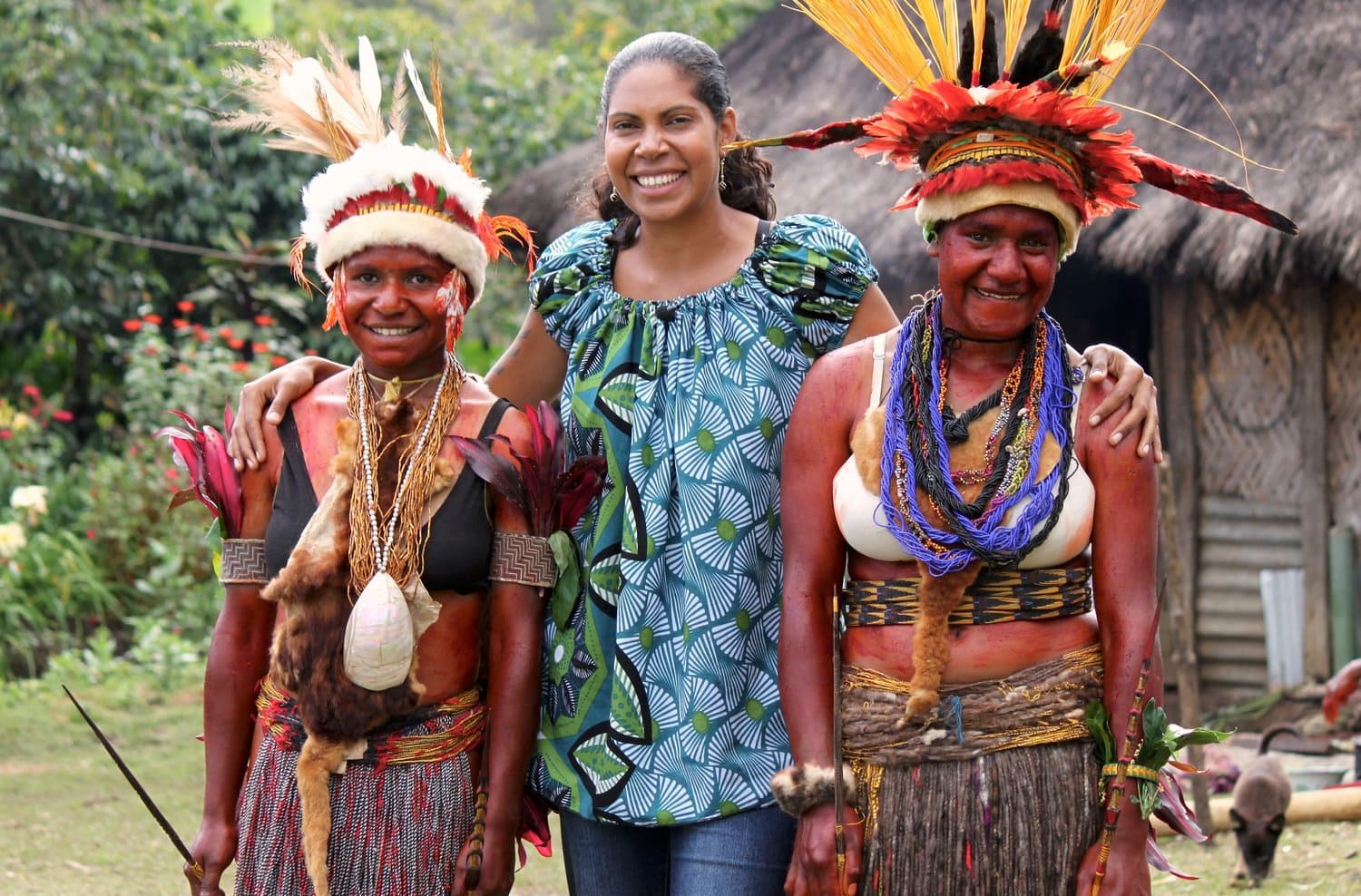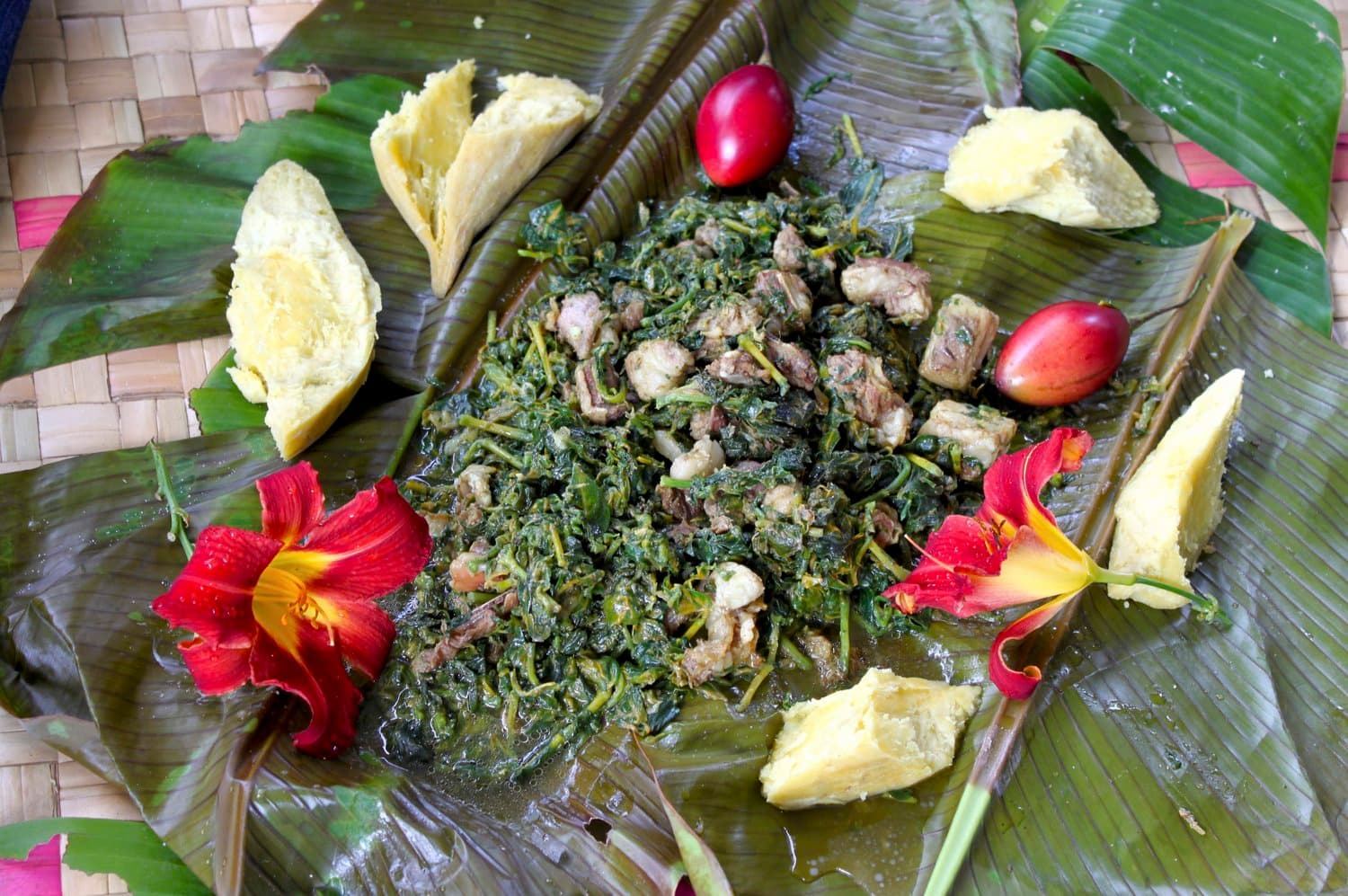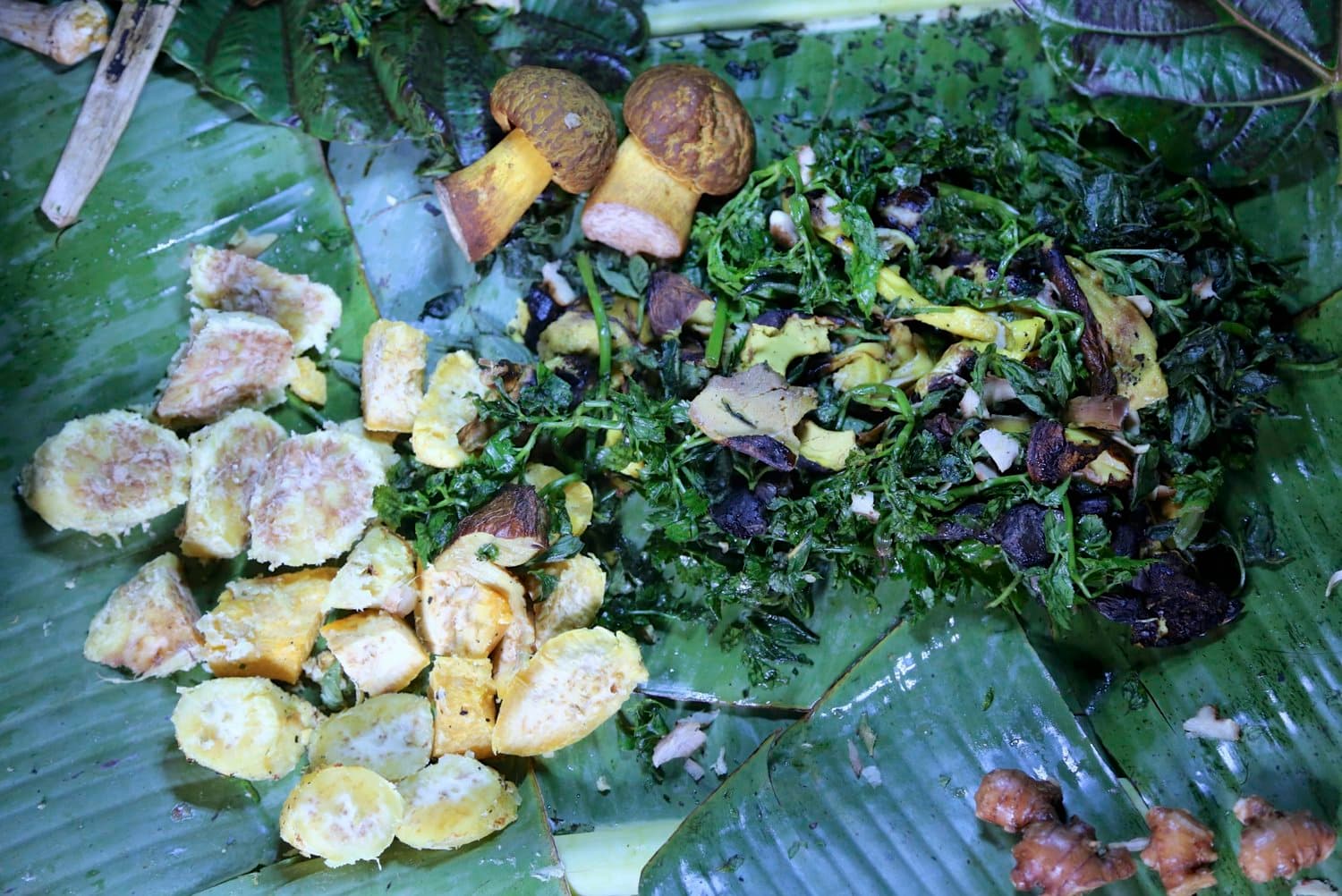Storytelling and Food: How Pacific Islands are Revitalizing Pride in their Food Culture
Source: AgroEcology Fund

Jennifer with two Gorarave girls preparing for "Womanhood" ceremony
The bounty and diversity of Papua New Guinea can easily make one’s jaw drop. Home to a staggering array of endemic species and over 800 indigenous tribes, Papua New Guinea is also the world’s most linguistically diverse nation. This diversity has also birthed an incredible food culture that has been stewarded by local communities in their organic food gardens and surrounding rich environment over millennia.
Like many other Pacific Islands, Papua New Guinea is also vulnerable to modernization and climate change, which is threatening the food culture and biodiversity. Jennifer Baing-Waiko recognizes the power of media to revitalize pride among Papua New Guineans in their local culture and foodways. She is the host of Cafe New Guinea, a lifestyle show that films the unique cuisines of Papua New Guinea, from the majestic highlands to Kar Kar Islands to coastal reefs.
Jennifer is also the co-founder of Savé Papua New Guinea, a nonprofit that encourages Melanesians to preserve their unique traditional foodways, biodiversity and culture. Savé means “wisdom” or “to know” in Tok Pisin, a creole national language. Last year, the Agroecology Fund provided Savé Papua New Guinea with a grant to collaborate with five other innovative Melanesian groups to promote agroecology and improve community health and climate resiliency. The Food is Life project will also produce an educational tool kit with audio-visuals, films and a facilitator's guide to train indigenous food advocates in Papua New Guinea, Solomon Islands, Fiji and Vanuatu.
Q: What sparked your interest in using media to highlight the food culture in Papua New Guinea?
Jennifer: Papua New Guinea gets negative press globally, and we wanted to show a positive face. Food is a window where you can go to communities, speak with locals and get a sense of being in the real Papua New Guinea. We wanted to showcase the beauty of our people, the scenic beauty as well, and show our diverse foods. Today, we are completely removing our children from the gardens. They spend the whole day in school and are not learning from their mothers and fathers about their gardens, how to plant banana or how to harvest. Also now a highly refined diet is causing health problems.
Q: What made you take your film project to other Melanesian countries?
Jennifer: I originally became involved in agroecology through the Christensen Fund; one of our first projects was Cafe New Guinea. We were also introduced to the Slow Food movement and learned about the importance of agrobiodiversity through various networks and people, like Phrang Roy. We realized that this is perfect for Papua New Guinea and Melanesia, where communities are still living subsistence lifestyles. We also met people at Vanuatu Cultural Center and discussed what we need to do in each of our areas in Melanesia to encourage agrobiodiversity.

Bamboo cooking dish with lamb and kembempa fern greens from Tanna island, Vanuatu
Q: What are the threats to traditional foodways in Melanesia?
Jennifer: There are definite threats to the traditional food system; people want to make money planting coffee, cocoa, cabbages and broccoli. Traditional crops, like banana, taro and wild foods, mushrooms, wild greens are an important part of the diet, but now imported foods, like Irish potatoes have come to the market. This influence from outside has brought watermelons, tomatoes, cucumbers, eggplant. People are not diversifying their gardens as they used to. The fruits and greens eaten by elders are not consumed by the younger generations.
Savé Papua New Guinea was founded in 2007, and we realized that it was important to promote our cultural identity, environment, everything Melanesian. We want to promote positive things about our people and culture. It’s important to document some of these things, make them popular through media so that we remember where we came from as Melanesians and we can exchanges with other indigenous peoples around the world.
Q: What is the role of women in preserving agrobiodiversity?
Jennifer: In Papua New Guinea, indigenous women play a central role in food production. They don’t just produce for the family, they are also contributing to the nutritional value of meals. They are producing food crops, the more diverse a garden is producing, the more diverse the diet of a family. So women play a central role in the health of family and the nutritional balance lies in the garden. This central role needs to be highlighted and promoted so that women also know it's a powerful job they are doing.

Wild mushrooms and sweet potatoes with bush ferns prepared in Solomon Islands
Q: Can you share more about the Food is Life media project?
Jennifer: Last year we did the filming. We went to the central province in Papua New Guinea, met the community, and they took us to their garden and showed us their food and how they prepare the delicacies. We also documented their traditional fishing methods. We filmed in five countries in Melanesia. We went to Solomon Islands, where we filmed in the markets and shot different local foods that they identify with their culture. In Fiji, we interviewed farmers, what they produce culturally, what are the traditional cooking methods, whether it is with hot stones and burying food wrapped in banana leaves. There are medicinal properties of leaves cooked on hot stones. In New Caledonia we met many communities along the coast and up in the mountains. We saw cooking in the mangroves and in an Earth oven.
Cafe Melanesia (film series) will promote Melanesian culture and food culture to audiences in these islands. We are now working on creating the educational kits and dissemination of information. The kit will also have DVD sets that the trainer or community leader can play in communities, go through resource kit on what's agroecology, agro-biodiversity and food sovereignty to educate communities. The goal is to protect and preserve their agrobiodiversity, which is also linked to dietary diversity throughout Melanesian countries.
Q: What has been the impact of the films of Cafe New Guinea?
Jennifer: The first production of Cafe New Guinea was showed on national television in Papua New Guinea, as well as in Australia, Maori TV in New Zealand. Our National airline, Air New Guinea, also showed our films in flight entertainment. The people love it. They love watching different food cultures and learning more about Papua New Guinea. Children love the programs, as well as adults. They love seeing their own food and culture on TV. They see a lot of programs on TV from other cultures and countries. It’s important for them to see their own food and their own culture as well.
Q: How is climate change impacting Melanesian islands?
Jennifer: We see unpredictable weather patterns; it’s supposed to be dry season right now but it’s raining. We had rain for three weeks straight with brief moments of sunlight. We have also had periods of drought. It’s very important for culturally valuable foods like taro to have rain or they get dried up. We need to find a wet region to save Taro seeds. Our staple Marasri banana, which we don’t have to plant again and again is threatened by a pest coming through. We have a special dish that we make with ripe banana and coconut called ganamjub, a sweet porridge. These pests that we don’t know about are destroying our staple foods. These foods are key to our culture. This is happening throughout the Pacific--foods that have a big cultural value are being destroyed. Agrobiodiversity is really important for our survival. If taro is not productive because of dry season, you have sweet potato that is drought resistant or tapioca planted in your garden. You have to make sure your garden is diverse. Agrobiodiversity and climate change are linked together. People have to diversify not just what they are planting but where they are planting as well; they need more than one garden place, one close to the riverside during drought and away from the river during rains.
I am thankful for funds available for these projects and people out there who see the importance of it. What the Agroecology Fund is focusing on is really important to indigenous farmers worldwide. Often communities that we are working with in Papua New Guinea are overlooked by larger funders.
